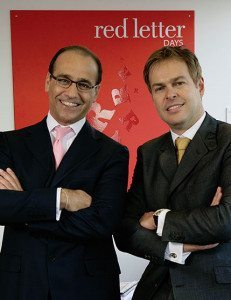Entrepreneurs
Why Peter Jones Is So Successful
The persistence and determination of Peter Jones means that Success was his only option.
Peter Jones estimated net worth is $475 Million.
Peter continues to expand his business empire and his personal brand. He is perhaps best known for his role in the TV Show’s Dragon’s Den and American Inventor.
Peter has earned his hundreds of millions from a diverse range of business interests, starting with making computers and opening a cocktail bar before progressing into mobile phones, media, leisure, property and TV shows.
Jones’ passion for expansion has led him to become an entrepreneur in a wide range of businesses as well a well respected startup investor.
Peter Jones’ First Business
 Peter was a visionary from a very young age, he recalls how he would sit in his dad’s office and imagine running a multi-million dollar business. Peter was still a teenager when he realised that he had the talent and skills to be a successful businessman. He combined this business acumen with a love of tennis and spent several summers working at his English Teacher’s summer tennis school. Always keen to learn, Peter wasn’t just working, he was learning. Peter wanted to understand how the business worked and discover how he could do it himself.
Peter was a visionary from a very young age, he recalls how he would sit in his dad’s office and imagine running a multi-million dollar business. Peter was still a teenager when he realised that he had the talent and skills to be a successful businessman. He combined this business acumen with a love of tennis and spent several summers working at his English Teacher’s summer tennis school. Always keen to learn, Peter wasn’t just working, he was learning. Peter wanted to understand how the business worked and discover how he could do it himself.
Peter didn’t stop there, he went on to pass the exams required to be a tennis coach and opened his own tennis school. As far as Peter is concerned, this is where he became an entrepreneur because he was driven by passion under the tutelage of a mentor that he loved.
Peter’s Twenties
After leaving his teens behind, Peter showed no signs of slowing down. He founded a successful computer business which led him to finally start to walk in his vision of a nice house, luxury cars and a large disposable income. However, the business took a turn for the worse and he ended up losing it. After the fall of the computer business, Peter opened a cocktail bar and a computer support business, with the cocktail bar losing him a substantial amount of money.
As his twenties came to close, Peter had no car, money or house so he took a job a in a business that he would end up running in less than a year.
“I passionately believe that you should start a company that you really believe in. Don’t start something that you have no interest in, start something that you’re passionate about.” Peter Jones
Peter’s Business Empire
Phones International Group
(Founded in 1998)
 Peter’s next venture after leaving his corporate position was to set up Phones International Group to provide wireless and mobile communications solutions. When the business was in its infancy Peter’s bed was the office floor. However, by the end of the first year revenue had reached $21 million and $65 million by the end of the second year.
Peter’s next venture after leaving his corporate position was to set up Phones International Group to provide wireless and mobile communications solutions. When the business was in its infancy Peter’s bed was the office floor. However, by the end of the first year revenue had reached $21 million and $65 million by the end of the second year.
Peter had founded one of the fastest growing businesses in Europe with a turnover of more than $220 million by 2006.
“Believe in yourself, never give up and go about your business with passion, dive and enthusiasm.” Peter Jones
Red Letter Days
(Purchased in 2005)

In 2005, Jones combined with fellow Dragon’s Den star Theo Paphitis to rescue the company Red Letter Days. Peter’s new company gives experience day vouchers as personal gifts and corporate rewards, ranging from spa days, to racing cars, parachuting and kayaking.
Immediately after taking over the company, Peter and Theo Paphitis decided to honour $25 million of outstanding vouchers to customers.
Jessops
(Purchased in 2013)

After the UK’s legendary photographic retailing giant entered administration in early 2013, Peter Jones stepped in and resurrected the business.
Peter invested several million pounds into the business and has since taken the company from 0 retail stores up to 37 in a very short space of time. Another testament to Peter’s ‘can do’ attitude.
Peter’s Investments
From 2004 onwards Peter Jones founded and invested in many other businesses including Wines4Business.com, Celsius Recruitment, Reggae Reggae Sauce and Concentrate Design which creates products that aid the concentration of children in schools.
Peter on TV
Peter has worked on three major television projects:
1. Dragon’s Den for the BBC which shows entrepreneurs present their business ideas to a panel of ‘Dragons’, one of which is Peter Jones. The entrepreneurs pitch for financial investment for a stake of their company in return.
2. American Inventor which he sold to the American broadcasting company and was co-produced by the Peter Jones Television Company Fremantle and Simon Cowell. The show on which Peter Jones was a judge went on to put ABC ahead of other networks and became a number show in America.
3. Tycoon was produced by the Peter Jones Television Company after Peter signed a deal with UK broadcaster ITV to become the face of business television. The programme where Peter searches for entrepreneurs with ideas that he can turn into profitable companies achieved viewing figures in excess of 2.1 million people.
The Present Day
Peter continues to have many interests across a broad range of businesses that employ over 1,000 people. generating sales upwards of $370 million. As an investor, Peter regularly adds to his ever increasing portfolio of over 40 businesses within the publishing, TV, entertainment, food, new media and product design industries.
Adding to his own, personal interests Peter gives a lot back by focusing on developing Entrepreneurial talent within the UK with a particular focus on allowing young people and young enterprise to thrive under the right guidance.
Conclusion
Everything that a young Peter Jones sat and visualized in his father’s office became his reality. There was nothing that could dampen the resolve of this inspirational entrepreneur. Businesses collapsing couldn’t stop him, expensive cocktail bar investments couldn’t stop him, sleeping on his office floor couldn’t stop him. Nothing can stop Peter Jones, that is what makes him successful.
As Peter Jones continues to give back and develop young, entrepreneurial talent he will continue to take calculated risks and laugh in the face of any adversity.
An incredible man who can teach us all a lot about about the value of self-belief and persistence.
Peter Jones Golden Rules for Success
Business
Why Smart Entrepreneurs Are Quietly Buying Gold and Silver
When stocks, property, and cash move together, smart business owners turn to one asset that plays by different rules.

You’ve built your business from the ground up. You know what it takes to create value, manage risk, and grow wealth. But here’s something that might surprise you: some of the most successful entrepreneurs are quietly adding physical gold and silver to their portfolios. (more…)
Business
Why Entrepreneurs Should Care About AI Automation Testing
AI automation testing is quietly becoming the unfair advantage behind faster launches, fewer bugs, and startup growth that doesn’t break under pressure.

Faster than ever, the online world pushes entrepreneurs to build sharper tools while moving at full speed. Launching apps, services, or systems? One thing remains clear: fragile code slows everything down. (more…)
Business
Why Smart FMCG Entrepreneurs Outsource What They Can’t Automate
From label mistakes to premium gift sets, manual co-packing gives growing FMCG brands the speed, precision and flexibility in-house teams can’t match.

In the fast-moving consumer goods industry, success isn’t just about having a great product. It’s about speed, efficiency and knowing when to focus your energy on what truly matters. (more…)
Business
The Simple Security Stack Every Online Business Needs
Most small businesses are exposed online without realising it. This simple protection stack keeps costs low and risks lower.

Running a business online brings speed and reach, but it also brings risk. Data moves fast. Payments travel across borders. Teams log in from homes, cafés, and airports. (more…)
-

 News3 weeks ago
News3 weeks agoBrandon Willington Builds 7-Figure Business by Ignoring Almost Everything
-

 Health & Fitness3 weeks ago
Health & Fitness3 weeks agoWhat Minimalism Actually Means for Your Wellness Choices
-

 Did You Know3 weeks ago
Did You Know3 weeks agoWhy Most Online Courses Fail and How to Fix Them
-

 Business3 weeks ago
Business3 weeks agoIf Your Business Internet Keeps Letting You Down, Read This
-

 Business2 weeks ago
Business2 weeks agoEntrepreneur’s Guide to Pay Stubs: Why Freelancers and Small Business Owners Need a Smart Generator
-

 Business1 week ago
Business1 week agoThe Salary Shift Giving UK Employers An Unexpected Edge
-

 Business1 week ago
Business1 week agoThe Simple Security Stack Every Online Business Needs
-

 Scale Your Business1 week ago
Scale Your Business1 week ago5 Real Ways to Grow Your User Base Fast






























2 Comments